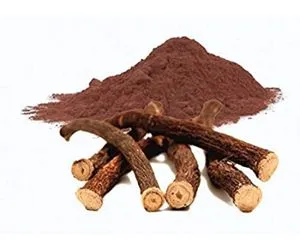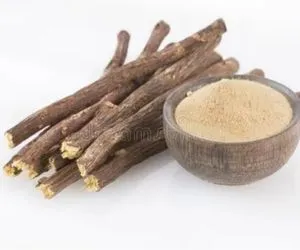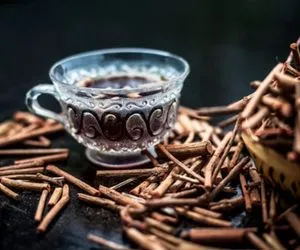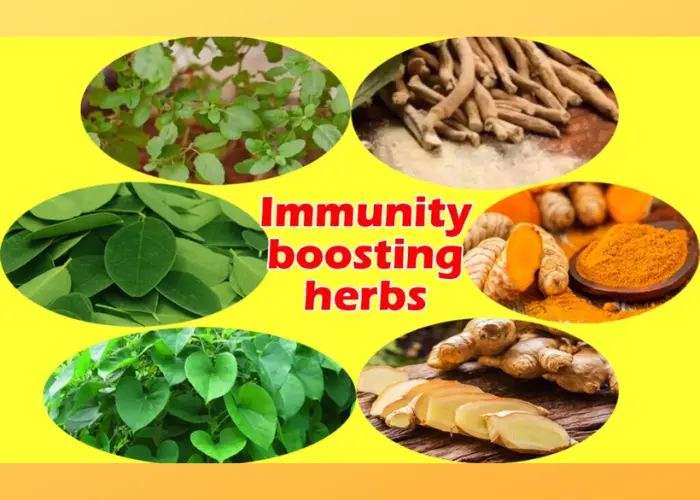Ayurveda of India has mentioned herbs like Giloy, mulethi for treating illness, boosting immunity, managing cholesterol levels and many more. But did you know that the Ayurveda of India has herbs mentioned in it which are capable of purifying blood which ultimately leads to a remedy for health issues, especially skin conditions. It is found throughout the country India and called Indian Madder in English. This blood purifying herb is Manjistha or Manjishtha.
What is Manjistha ?

Manjistha plant botanically called “Rubia cordifolia” has a long and cylindrical root with red coloured bark. Its flowers are small, white, or greenish, whereas fruits are globose, dark purple or, black. Stems have a long, woody, and rough base. It is also used as a natural hair dye and food colourant.
Manjistha alternate names :-
| Name :- | Manjistha |
| Botanical Name :- | “Rubia cordifolia” |
| Sanskrit :- | Aruna, Bhandiri, Chitrangi, Gauri, Harini, Hemapushpi, Janani, Jingi, Jvarahantri, Kala, Kala-meshika, Kalabhandika, Kandira, Kshetrini, Latayashti, Lohitika, Raktanga, Raktayashti, Rasayani, Rohini, Samanga, Tamramuli, Tamravalli, Tamrika, Vapra, Vasrabhushana, Vasraranjani, Vastrabhusana, Mandukaparni, Manjishtha, Nagakumarika, Ragadhya, Ragangi, Rakta, Vijaya, Yojanaparnika, Yojanavalli, Yojanavallika, Munjistha |
| Hindi :- | Majith, Manjit, Munjistha, Munjeet, Lachkura, Malo, Mamjith |
| Bengali :- | Manjistha, Munjeet, Manjith |
| Tamil :- | Amutacakaram, Arunai, Cakkarankam, Cavalkoti, Cevvalli, Citti, Kalametikai, Kancini, Kokilavan, Mancatti, Mancisti, Manicotti, Mancukam, Manditta, Manjishi, Manjiti, Nakanokam, Paccaimuruli, Panti, Puncitti, Sevallikodi, Shevvelli, Tamiramulam, Tamiravalli, Tampuramalli, Yocanavalli, Manjittie vayr |
| Telugu :- | Chiranji, Mandastic, Manderti, Manjishta, Manjishtathige, Tamravalli, |
| Malayalam :- | Sivollikkodi, Poont, Ellumbarakki, Manjishta, Poovathu, Manjetti, Chovvallikkodi, Manjadi |
| Kannada :- | Chithravalli, Ishtamadhuka, Jingi, Kaadu balli, Kai kuyika, Manjushtha, Siragatti, Somalate, Tharakalu balli, Yojana balli |
| Punjabi :- | Manjitha, Chitravalli in Marathi, Manjit |
| English :- | Indian Madder |
Manjistha uses

The manjistha uses are as follows:
- It has been used in the treatment of liver fluke, maggots, dysentery, wounds, and intestinal worms in animals.
- It is commonly used as a blood purifier and has many other therapeutic properties like calcium channel blocking, anti-diabetic, anti-stress, and anti-platelet.
- It has anticancer activity and is used in the treatment of skin disorders.
- The anthraquinones found in it have many biological activities, such as antimicrobial, hepatoprotective, antifungal, immunomodulatory, hypotensive, anti-inflammatory, analgesic, antimalarial, antioxidant antileukemic, and mutagenic
- It is a magical remedy for all sorts of hormonal problems. It plays a very important role in regulating periods, treating postnatal ailments, and even helps to treat excessive abdominal pain/bleeding.
Frequently Asked Questions about Manjistha
What is Manjistha used for ?
It is commonly used as a blood purifier and has many other therapeutic properties like calcium channel blocking, anti-diabetic, anti-platelet, and anti-stress. It is used in the treatment of skin problems and has anticancer properties
Does Manjistha whiten skin ?
Yes, it whitens skin as it can help you manage acne and pimples by inhibiting the growth of acne-causing bacteria due to its antioxidant property.
Can we apply Manjistha daily on our face ?
Yes, you can apply it daily on your face as one can use manjistha for skin whitening, both internally and externally. It can therefore be used externally with multani mitti face packs, chandan powder, aloe gel, yoghurt etc
Does Manjistha reduce weight?
Yes, it helps in reducing weight as the abundance of flavonoids and bioactive components in its root helps the body shed excess weight faster.
Is Manjistha good for acne ?
Yes, it is good for acne as it is sanctified with antioxidant, antimicrobial and anti-inflammatory properties and it helps in treating a host of skin infections too.
Manjistha benefits

Helps in Diarrhoea
Its potent antibacterial and anti-diarrhoeal properties are extensively used for removing bacteria from the intestines that causes diarrhoea and other intestinal infections. It removes the toxins from the body and also effectively reduces the frequency of stools and even treats dysentery.
Treats Respiratory issues
Its powerful anti-inflammatory, anti-biotic, and anti-asthmatic properties made it a well-known traditional remedy for all sorts of respiratory troubles. It is important in treating the common cold, sore throat, cough and flu symptoms and also actively thins and loosens rheum particles within the chest and nasal cavities and eases breathing and helps the body to get rid of mucus. It is also beneficial for treating asthma and other bronchial conditions.
Helps in Liver Conditions
It has potent hepatoprotective and hepatostimulative properties which makes it remedy for most liver anomalies like jaundice. Manjistha provides support to the liver functioning by secreting bile and also helps the liver enzymes to tune down to normal levels. It also cleanses and detoxifies the liver and improves liver functioning.
Helps in Weight loss
Its abundance of flavonoids and bioactive components helps the body to shed excess weight faster. It is enriched with fibre and essential nutrients helps to satiate sudden hunger pangs and prevent overeating and plays an important role in one’s weight loss. The herb also reduces the accumulation of LDL or bad cholesterol in the body, thereby improving metabolism and facilitating the body in maintaining a proper weight.
Prevents Ulcer
The anti-inflammatory and anti-ulcer properties of its bright-red root holds high significance in treating different types of ulcers like ulcerative colitis, peptic ulcer, canker sores or mouth ulcers, etc. Its bioactive components help in healing mouth and gastric ulcers and also helps to speed up the healing process and improves wound contracting ability, tissue regeneration, and wound closure so as to facilitate faster healing.
Promotes Digestion
Its anti-flatulent property reduces the formation of gas in the alimentary canal, thus reducing flatulence, bloating, constipation, and abdominal distension. The antacid property of the herb prevents the formation of excessive acids in the stomach hence helps in treating indigestion, ulcer, gastritis and promoting better absorption of nutrients in the body.
Treats Kidney stones
Its ruberythric acid are extremely beneficial in treating kidney stones and other kidney disorders as well. This bio-active component reduces accumulation and deposition of calcium and magnesium which ultimately leads to stones in the kidneys and ureter. It is also a potent antispasmodic agent which allows the already formed kidney stones to easily pass through the urinary system with less pain.
Good for Heart
It manages irregular cardiac rhythm and prevents lipid peroxidation and accumulation in the blood vessels which in turn reduces the risk of atherosclerosis, heart blocks, heart attacks, blood clots, etc. It also reduces platelet aggregation, and facilitates smooth flowing of blood throughout the body. The potent vasodilatory action of the herb manages high blood pressure as well.
Reduces the risk of Cancer
It is a beneficial component in managing malignant cancers/tumours, especially ovarian and uterine cancers. The abundance of quinones and cyclic hexapeptides in it actively helps in combating the cancer cells in the colon, breast, and liver and even manage histiocytic lymphoma, myeloid leukaemia, and other types of cancer.
Good for Skin
It has antioxidant, antimicrobial and anti-inflammatory properties which make it a one-step remedy for various skin conditions. Its blood purifying properties which helps in removing toxins from the blood, it helps in treating a host of skin infections as well. It helps in shielding the skin from oxidative radical damage due to the harmful UVA and UVB rays and also reduces the risk of the various signs of ageing like wrinkles, blemishes, spots, fine lines, and dark circles. It is also beneficial for treating allergic conditions like acne, pimples, zits, psoriasis, scabies, eczema and many more.
Conclusion
Manjistha is an incredible blood-purifying herb that has immense regenerative properties. Its essential bio-active ingredients and the quarry of therapeutic properties, it is extensively used for treating a variety of skin conditions, enhancing lymphatic functions, remedying flu and feverish conditions, relieving liver problems, managing cough and cold, sore throat, treating respiratory diseases, preventing viral infections, promoting digestion and many more.




